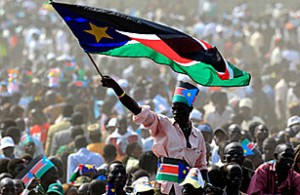South Sudan’s Ruling Party Divided
 The South Sudan’s People’s Liberation Movement (SPLM), ruling party of the relatively young South Sudan, is in the middle of an internal crisis, which is threatening to divide the party and derail the nation.
The South Sudan’s People’s Liberation Movement (SPLM), ruling party of the relatively young South Sudan, is in the middle of an internal crisis, which is threatening to divide the party and derail the nation.
Sometime last month, President Salva Kiir Mayardit announced the dissolution of two of the party’s most important administrative structures; the political bureau (PB) and the national liberation council (NLC). According to President Kiir, the current office holders have exceeded their tenure, and failure to hold the party’s scheduled elective convention earlier in the year has prevented the election of new officials to replace the current ones.
This was not the first time President Kiir had made a daring decision, which both his party members and several commentators found alarming. In June this year, President Kiir unexpectedly fired his deputy and the entire cabinet.
According to some pundits, the President’s decisions reflects an internal power struggle within the SPLM ahead of South Sudan’s 2015 elections. President Kiir’s position as chairman of the party and leader of the nation is apparently being threatened by several of his colleagues, including his former deputy, Riek Machar.
In response to the President’s latest directive, last Friday several senior members of the SPLM, including the former vice President Riek Machar and Rebecca Garang (wife of the late John Garang), held a press conference at the party’s offices in Juba to express their concerns.
According to a statement by the group, the President’s directives are increasingly dictatorial and are derailing the party from its goals. Speaking at the conference, Machar noted that divisions within the SPLM leadership and the “dictatorial tendencies” of the SPLM chairman President Kiir “are likely to cause instability in the party and in the country.” He also accused the President of mismanaging the party, according to him, “The SPLM is not a ruling party…In practice, decisions are made by essentially one person.”
Following the press conference, on Saturday 7th December several media houses are reported to have had copies of their publications confiscated because it contained details of the conference. An unidentified reporter who attended the conference revealed that at the end of the conference, security officers warned several of the reporters against broadcasting or publishing the message of the conference.
This notwithstanding, several media houses, including Al Jazeera and Sky News TV, made a point to broadcast the proceedings of the meeting. In South Sudan, at least two publications, Al Masir and Juba Monitor, are reported to have had copies of their newspapers confiscated temporarily and their workers warned against distributing the papers as it contained reports of the censored news conference, according to the Sudan Tribune.
South Sudan gained its independence in 2011 following a referendum in which a majority of the local ethnic groups voted for a secession from Sudan after decades of war. The young nation has since struggled to function administratively amidst internal conflicts in the ruling party, widespread corruption, deepening ethnic division and, most notably, recurring disputes with Sudan.
President Kiir has come under criticisms from several commentators in the past for failing to tackle the divisions within his party, which some say are being propagated by the “anti-Garang” elements within the ruling SPLM. But the President recently relayed that he will not overturn his decisions and will not also postpone or cancel the country’s 2015 elections.
According to the Sudan Tribune, a senior government official revealed that the President is due to call an extraordinary convention of the party’s senior leaders this week to adopt some basic SPLM documents which have already been discussed. It is unclear if the party leaders will honor the President’s call, given that the President has not conceded to their requests—one of which is for President Kiir to convene the political bureau and set a vision for the NLC “so as to correct the deviation from the SPLM vision and direction. And address the present challenges within the SPLM with the view of revitalizing and restoring the SPLM to the driving seat.”
Photo: Enthusiastic nationals of South Sudan wave the nation’s flag during its independence day celebrations, July 2011. [Thomas Mukoya/ Reuters]